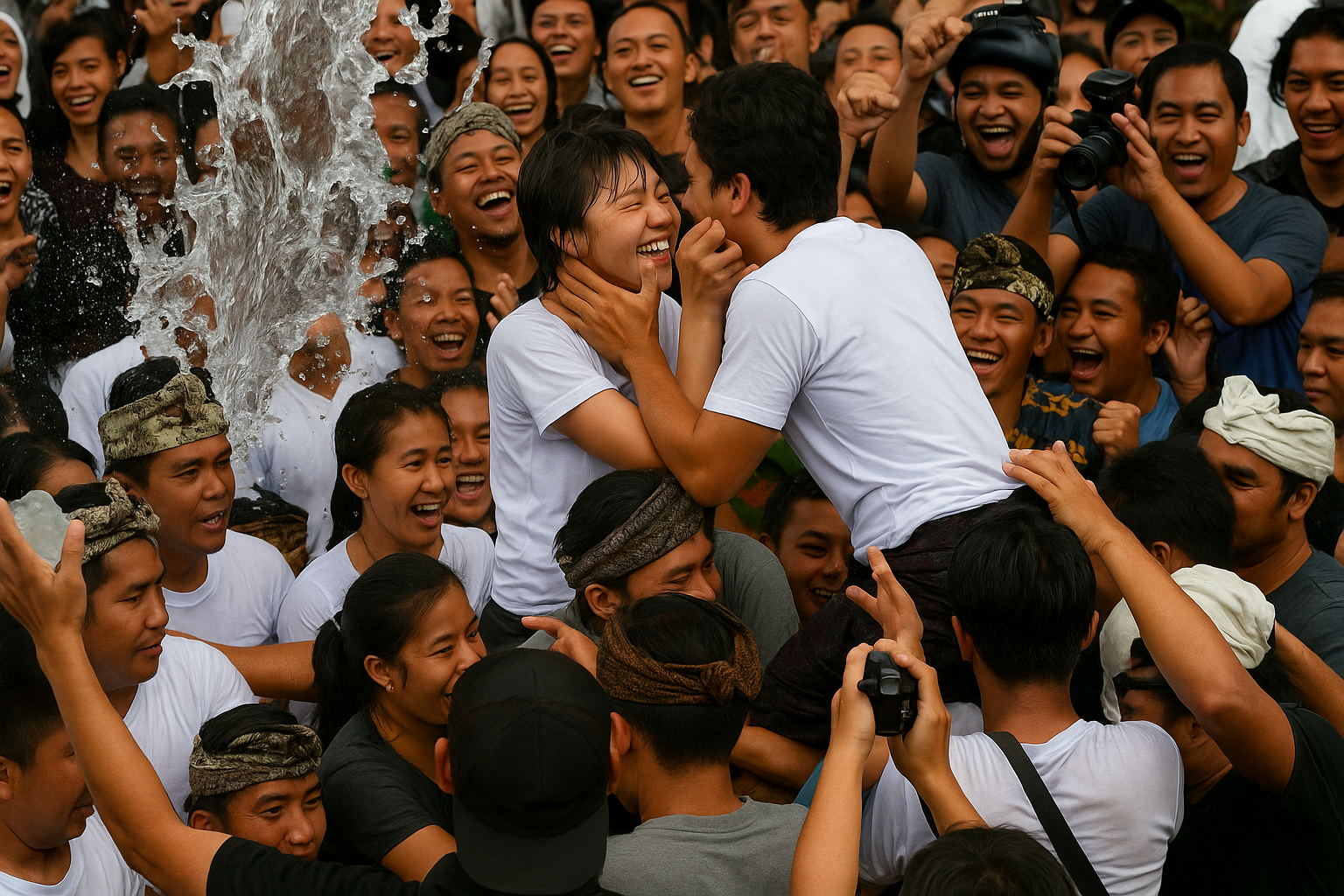Bali Cultural Festival – Imagine arriving in Bali, where the warm tropical air and the scent of incense fill the breeze.
Suddenly, you’re caught in the midst of a colorful procession, with dancers, drummers, and locals in vibrant costumes. You’re not just watching—you’re part of the celebration, part of something ancient and magical. Bali is more than stunning beaches and sunsets; it’s alive with rich cultural festivals that offer an unforgettable, soul-touching experience.
Ready to dive into Bali’s traditions? Let’s explore the top festivals you won’t want to miss.
Why Bali Cultural Festival Are So Special
Bali’s festivals are far from just fun and games. Rooted in Balinese Hinduism, each festival is an act of devotion and a way to maintain the balance between the human world and the divine. From offering prayers for good harvests to paying respect to ancestors, the festivals serve as vital expressions of spirituality.
This deep cultural connection makes each festival a moving and meaningful experience for those lucky enough to witness it. let me guide you how many cultural festival in Bali.
Nyepi: Bali’s Silent Day of Reflection
Nyepi is the Balinese New Year, a deeply spiritual day that marks the start of the Hindu lunar calendar year. It’s a day of silence, fasting, meditation, and self-reflection. Unlike typical New Year celebrations around the world, Nyepi is not about parties or fireworks—it’s about cleansing the soul and resetting the balance between humans, nature, and the gods.
Nyepi usually falls in March, and the entire island comes to a standstill. For travelers, this might feel unusual, but it’s a special time for reflection, self-discovery, and tranquility.
Melasti Ceremony
In the days leading up to Nyepi, Bali’s beaches come alive with the Melasti Ceremony, a powerful purification ritual where locals dress in ceremonial white attire and carry sacred objects to the sea. Melasti symbolizes the cleansing of impurities from both the earth and the human spirit.
This is one of the most photogenic and spiritual ceremonies you can witness in Bali, especially along Sanur, Kuta, and Canggu beaches.
Ogoh-Ogoh Parades
On Pengrupukan night, the eve of Nyepi, Bali erupts with the vibrant Ogoh-Ogoh parades. Villages showcase giant, intricately crafted effigies representing demons and evil spirits, paraded through the streets to exorcise negativity before the New Year.
In recent years, Ogoh-Ogoh have also served as creative social commentary, addressing environmental and political issues. The event culminates in the symbolic burning of the effigies, purifying the community for Nyepi.
Best spots to experience: Denpasar, Kuta, Ubud, and Gianyar.
Galungan And Kuningan: Celebrating the Triumph of Dharma
Galungan and Kuningan are two of Bali’s most revered and spiritually significant festivals. Galungan marks the victory of Dharma (good) over Adharma (evil), while Kuningan is the ceremonial farewell to ancestral spirits who are believed to return to the heavens.
The Spirit of Galungan
During Galungan, Balinese families make elaborate preparations to welcome their ancestors back to the earthly realm. Homes are cleaned and decorated, and offerings are prepared in every corner of the island.
One of the most striking visuals during this time is the penjor, tall bamboo poles adorned with coconut leaves, flowers, and fruits, symbolizing prosperity and gratitude to the gods. These penjor line village streets, creating a breathtaking display of devotion and beauty.
Kuningan: The Closing of the Spiritual Window
Ten days after Galungan, Kuningan is celebrated as a day of thanksgiving and farewell. Special yellow offerings (kuning means yellow) are presented, and families pray for blessings and protection until the next Galungan cycle.
For travelers, experiencing Galungan and Kuningan is an opportunity to witness Bali’s deep spiritual connection between the living and the unseen world. The energy during these festivals is vibrant, with temples filled with worshippers dressed in traditional attire.
Bali Arts Festival: A Month of Cultural Immersion
Held every June and July in Denpasar, the Bali Arts Festival is the island’s largest celebration of Balinese art, dance, music, and crafts. It’s a month-long cultural showcase featuring traditional dances, puppet shows, art exhibitions, and parades.

Unlike the daily tourist shows, the Bali Arts Festival is organized by and for the Balinese community, offering a more authentic glimpse into the island’s creative soul. It’s an ideal event for those who want to immerse themselves in Bali’s living traditions. Travelers looking to explore the richness of Balinese culture in one place will find the Bali Arts Festival an unforgettable highlight.
Omed-Omedan: The Kissing Festival of Youth
Unique to the Banjar Kaja Sesetan community in Denpasar, Omed-Omedan—also known as the Kissing Festival—takes place the day after Nyepi. This joyful event is not just for fun; it’s believed to ward off bad luck and strengthen social bonds among local youth. Young unmarried men and women are gathered in the street, divided into two groups.

Amid cheers from the crowd, they are pushed together, and playful kissing ensues. The scene is chaotic, cheerful, and wet, as bystanders splash water over the participants to add to the festivity. Though lighthearted, Omed-Omedan carries spiritual significance, reflecting the communal spirit, fertility, and togetherness of Balinese society.

Ngaben: The Sacred Balinese Cremation Ceremony
Ngaben, Bali’s traditional cremation ceremony, is among the island’s most profound rituals. It’s not a somber funeral but a vibrant celebration of the soul’s journey toward reincarnation.
During the ceremony, families and villages carry elaborate towers, accompanied by music and chants, before the body is cremated to release the soul. Travelers witnessing Ngaben are observing one of Bali’s deepest expressions of life, death, and rebirth.
Do’s and Don’ts When Joining Bali’s Festivals
Attending cultural festivals in Bali can be an unforgettable experience, but it’s important to approach them with respect and understanding. Here’s a guide to help you enjoy the celebrations while honoring local customs:
✅ Do’s
Dress Modestly and Respectfully
When attending ceremonies or entering temples, always wear appropriate attire. This usually means a sarong and sash for both men and women
Observe Before You Join
If you’re unfamiliar with the rituals, take a moment to watch and learn. Balinese ceremonies have deep spiritual meanings, and observing quietly helps you understand the flow and significance of the event.
Be Mindful of Offerings
You’ll see small baskets of offerings, called canang sari, placed on the ground, streets, or temple entrances. Be careful not to step over or disturb them, as they are offerings to the spirits.
Follow the Lead of the Locals
If you’re invited to participate, follow the locals’ instructions closely. They will gladly guide you on how to pray or make offerings properly.
❌ Don’ts
Don’t Interrupt or Walk in Front of Ceremonial Processions
Always give space to processions and ceremonial activities. Never walk in front of priests, offerings, or worshippers during rituals—it’s seen as disrespectful.
Don’t Climb or Sit Higher Than the Priests or Sacred Objects
In Balinese culture, the head is considered the most sacred part of the body. Avoid standing or sitting higher than priests, shrines, or offerings.
FAQ About Bali’s Cultural Festivals
Q: When is the best time to visit Bali Cultural Festival?
A: March (Nyepi, Ogoh-Ogoh, Melasti), June-July (Bali Arts Festival), and during Galungan and Kuningan cycles, which occur every 210 days.
Q: Can tourists join Bali Cultural Festival?
A: Yes, but always observe respectfully. Some processions allow tourists to observe or join if invited by locals.
Q: Where can I see Ogoh-Ogoh Parades?
A: Major parades are in Denpasar, Kuta, Ubud, and Gianyar, but every village in Bali holds its own vibrant parade.
Learn Something New in Bali: Educational & Cultural Trip Experiences
Conclusion
Bali’s cultural festivals are not just events, they are windows into the island’s spiritual heart and soul. From the introspection of Nyepi to the fiery chaos of Ogoh-Ogoh, the joy of Galungan to the artistry of the Bali Arts Festival, each celebration offers an authentic experience you won’t find anywhere else.
You might also like: JTB Marine Activity – May 2025 Sale – Bali Mangrove Forest Tour
Want to experience Bali’s festivals comfortably and hassle-free? Book your trip with Kura-Kura Bus and explore Bali’s cultural heartlands safely and easily.

















